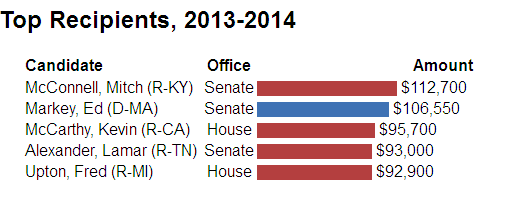Big Pharma owns Tennessee, 2nd most medicated stat
Post# of 36729
Forbes study that ranked Tennessee as the second-most medicated state in the nation. The study revealed that people in Tennessee take an average of about 17 prescriptions a year. The national average is 11.6 prescriptions a person.
According to the ProPublica analysis, drug company payments totaled at least $7.9 million to Tennessee-based doctors in 2009 and 2010 which ranks Tennessee as the 11th-highest statewide total found in the analysis.
Of all 535 members of Congress (100Senate / 435House) Sen. Lamar Alexander of Tennessee is the fourth highest recipient of 2013-2014 Big Pharma political campaign contributions ($93,000, not counting corporate donations to the party or PACS). Sen. Mitch McConnell of Kentucky received the highest amount from Big Pharma, $112,700 (not counting corporate donations to the party or PACS).

Dr. Jon W. Draud, the medical director of psychiatric and addiction medicine at two Tennessee hospitals ... During the last four years, the 47-year-old Draud has earned more than $ 1 million for delivering promotional talks and consulting for seven drug companies. Draud’s $1 million in drug company earnings is probably a minimum figure. Some of the seven companies he represented have reported their payouts for only a short time. And Draud has separately disclosed ties with at least four additional companies that haven’t revealed how much they pay speakers. By a wide margin, Draud’s earnings make him the best-paid speaker in ProPublica’s Dollars for Docs database , which has been updated to include more than $2 billion in payments from 15 drugmakers for promotional speaking, research, consulting, travel, meals and related expenses from 2009 to 2012.
http://www.alternet.org/doctors-paid-millions...big-pharma
2010
The Tennessean reported last week that Tennessee doctors rank in the top dozen nationally for the amount of money they’ve received in the past two years promoting drugs for the pharmaceutical industry. This controversial finding about drug payments to doctors in Tennessee comes on the heels of the release of a Forbes study that ranked Tennessee as the second-most medicated state in the nation. The study revealed that people in Tennessee take an average of about 17 prescriptions a year. The national average is 11.6 prescriptions a person. To get their medications, Tennesseans spent about $6.1 billion at retail pharmacies in 2009, according to the Henry J. Kaiser Family Foundation.
It is concerning to some that doctors in Tennessee are being heartily reimbursed for engaging in pharmaceutical promotional speaking events, whilst the public pays so much money for medicine. ProPublica, an independent nonprofit journalism source, began compiling a database called Dollars for Docs in October which documents pharmaceutical payments to doctors for speaking, consulting, and other promotional activities. The list includes information from Eli Lilly & Co., AstraZeneca, GlaxoSmithKline, Johnson & Johnson, Merck & Co., Pfizer and Cephalon for various periods of 2009 and 2010.
According to the ProPublica analysis, drug company payments totaled at least $7.9 million to Tennessee-based doctors in 2009 and 2010, which ranks Tennessee as the 11th-highest statewide total found in the analysis. The Tennessean reports that Dr. Hal Roseman, a Nashville cardiologist, and Dr. Jon W. Draud, a Nashville psychiatrist, have received payments approaching a quarter of a million dollars. Dr. Jan Brandes, who heads the Nashville Neuroscience Group at Saint Thomas Health Services, netted $111,150 in outside income over the past two years, mostly, according to The Tennessean, from speaker fees paid by drug company GlaxoSmithKline. She is a much sought-after headache specialist who gives seminars sponsored by the drug companies for whom she conducts trials. She defends these seminars by claiming she is there to educate others and not to push certain drugs. The response was similar from other doctors that The Tennessean reported make over hundreds of thousands of dollars in payments for speaker engagements: they defend these activities as being ways to publicize new ideas about how to treat a disease. The sentiment seems to be that compensation does not necessarily indicate bias.
Cardiologist Hal Roseman told The Tennessean that his patients are well aware of his involvement with the pharmaceutical industry and appreciate his knowledge of the studies of possible treatment agents. In apparent contradiction to this response, a poll of 1,250 adults conducted by the Consumer Reports National Research Center showed that half of respondents said they’d be concerned about the advice of a doctor who took as little as $500 from the pharmaceutical industry. 75 percent said they’d be concerned about doctors who accepted up to $25,000. The numbers in this case in Tennessee are generally $100,000 upwards of these numbers. Consumer advocates view compensation for physicians by pharmaceutical companies as an endangerment of the integrity of medicine and a potential addition to the US’s already high health-care costs.
Another physician in The Tennessean article says that her consulting work has nothing to do with her patients. Perhaps there are potential benefits to these relationships- physicians working with the drug companies might share expert information from work in the field. Pharmaceutically sponsored research has, it must be acknowledged, meant huge leaps in advances in disciplines like neurology.
The increased skepticism about ties to the pharmaceutical companies has led to more stringent policies on conflicts of interest. Vanderbilt University Medical Center implemented a policy last year that more tightly regulates disclosure from doctors and others about paid speaking engagements, consulting work and industry reimbursements for travel expenses. Increased scrutiny of the pharmaceutical industry means more transparency for consumers to make choices for themselves.
 (0)
(0) (0)
(0)